1. Early life and marriage
Teddy Kollek's early life, marked by migration and the formation of strong Zionist beliefs, set the foundation for his future dedication to Israel.
1.1. Birth and family background
Theodor Kollek, originally named Kollek TivadarHungarian, was born on May 27, 1911, in Nagyvázsony, a town located about 75 mile (120 km) from Budapest, Hungary. His parents were Alfred and Margaret (née Fleischer). They named him after Theodor Herzl, a key figure in the Zionist movement. In 1918, when Kollek was seven years old, his family relocated to Vienna, the capital of Austria.
1.2. Zionist convictions and early life in Vienna
Growing up in Vienna, Kollek adopted his father Alfréd's strong Zionist convictions. This early influence instilled in him a deep commitment to the establishment and development of a Jewish homeland.
1.3. Immigration and early activities
In 1935, three years before the Nazis' Anschluss (annexation) of Austria, the Kollek family immigrated to Mandatory Palestine, which was then under British control. In 1937, Kollek became one of the co-founders of Kibbutz Ein Gev, a collective community situated on the eastern shore of Lake Kinneret (Sea of Galilee). In the same year, he married Tamar Schwarz (1917-2013), who was the daughter of Rabbi Arthur Zacharias Schwarz (1880-1939) and granddaughter of Rabbi Adolf Schwarz (1846-1931), rector of the Israelite Theological School. They had two children: a son named Amos Kollek, born in 1947, who later became a film director, and a daughter named Osnat.
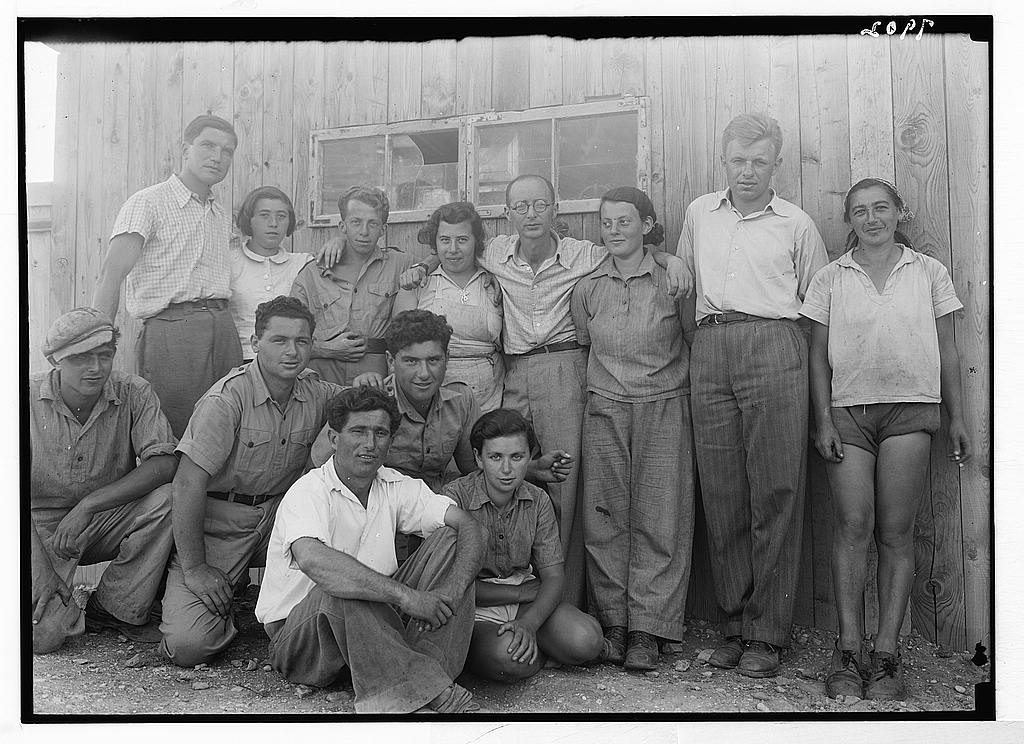
2. Intelligence services
Teddy Kollek played a significant, albeit often clandestine, role in intelligence and security operations during the crucial years leading up to and immediately following Israel's statehood.
2.1. The "Hunting Season"
In 1942, Kollek was appointed as the deputy head of intelligence for the Jewish Agency. Between January 1945 and May 1946, he served as the Agency's chief external liaison officer in Jerusalem. In this capacity, he maintained contact with the main representative of MI5 (British Security Service) and members of British Military Intelligence. During this period, as part of an initiative known as "The Hunting Season" or "Saison," Kollek acted as the Jewish Agency's point of contact with MI5, providing intelligence on right-wing Jewish underground groups such as the Irgun and Lehi (also known as the "Stern Gang"). He followed Reuven Shiloah in this role and was succeeded by Zeev Sherf, actively carrying out the Jewish Agency's policy of assisting the British in combating these groups. A notable incident occurred on August 10, 1945, when Kollek revealed to MI5 the location of a secret Irgun training camp near Binyamina, leading to the arrest of twenty-seven Irgun members.
2.2. Second World War
During World War II, Kollek worked on behalf of the Jewish Agency, striving to represent and protect Jewish interests across Europe.
2.3. Cooperation with the USA
From 1947 to 1948, Kollek represented the Haganah, the primary Zionist paramilitary organization in Mandatory Palestine, in Washington, D.C. In this role, he was instrumental in acquiring ammunition for Israel's nascent army during its formative years. Kollek was also a key figure in establishing a strategic alliance between the Israeli intelligence agency Mossad and the CIA of the United States in the 1940s and 1950s.
3. In national politics
Following his work in intelligence, Kollek became a close confidant and ally of David Ben-Gurion, Israel's first Prime Minister. From 1952, Kollek served in Ben-Gurion's governments as the Director General of the Prime Minister's Office, a pivotal role that placed him at the heart of national decision-making.
4. Mayor of Jerusalem
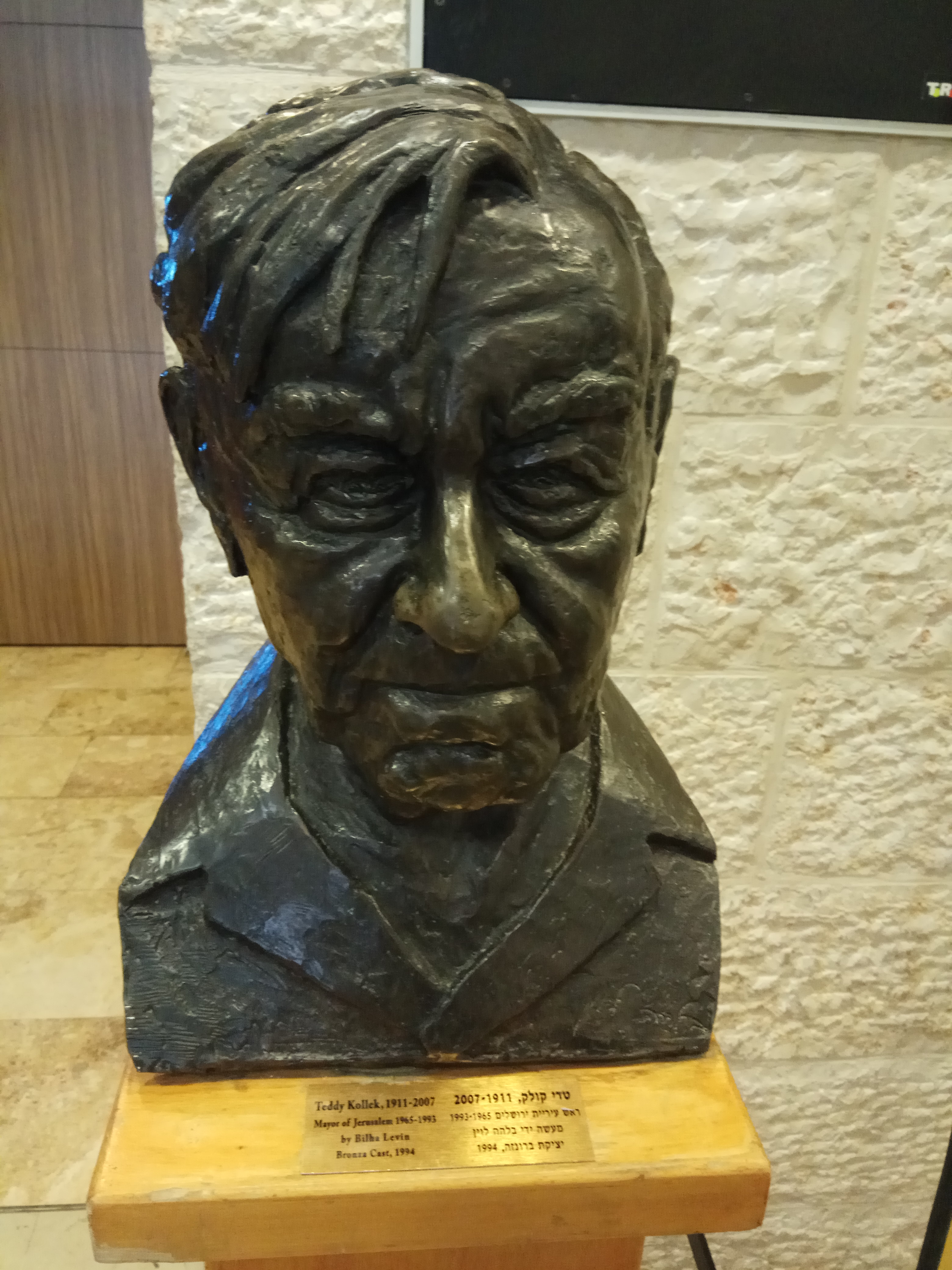
In 1965, Teddy Kollek was elected Mayor of Jerusalem, succeeding Mordechai Ish-Shalom. He served an unprecedented 28 years in office, winning re-election five times in 1969, 1973, 1978, 1983, and 1989. When reflecting on his decision to run for mayor, Kollek stated: "I got into this by accident [...] I was bored. When the city was united, I saw this as an historic occasion. To take care of it and show better care than anyone else ever has is a full life purpose. I think Jerusalem is the one essential element in Jewish history. A body can live without an arm or a leg, not without the heart. This is the heart and soul of it."
During his lengthy tenure, Jerusalem underwent significant development and modernization, particularly after its reunification following the Six-Day War in 1967. Kollek's efforts were so transformative that he was famously called "the greatest builder of Jerusalem since Herod". In 1993, at the age of 82, Kollek reluctantly sought a seventh term as mayor but was defeated by Likud candidate Ehud Olmert, who later became Prime Minister of Israel.
4.1. Relationship with the Arab community
Following the Six-Day War in 1967, East Jerusalem, which had been under Jordanian control since 1948, was captured by Israel and subsequently annexed. As the mayor of a newly unified Jerusalem, Kollek adopted a pragmatic and inclusive approach toward the city's Arab residents. Within hours of the transfer of authority, he promptly arranged for the provision of milk for Arab children, demonstrating his immediate concern for their well-being. This approach sometimes led some Israelis to consider him pro-Arab.
Kollek was a strong advocate for religious tolerance and made numerous efforts to engage with and reach out to the Arab community throughout his time as mayor. He ensured that Muslims continued to have access to Masjid Al-Aqsa (the Temple Mount) for worship, a key gesture of respect for religious freedom. While he firmly believed that Jerusalem should never be divided again and must remain under Israeli sovereignty, he also acknowledged the need for concessions to achieve a lasting peace settlement. After leaving office, Kollek's views on the annexation of East Jerusalem softened somewhat, indicating a continuing evolution in his thinking on the complex issue of the city's future.
4.2. Civic and cultural projects
Kollek dedicated himself extensively to numerous civic and cultural projects throughout his long mayoral term. He was the founder and head of the Jerusalem Foundation, an organization through which he raised substantial funds and helped finance a wide array of projects aimed at enhancing the city's infrastructure, educational institutions, and cultural landscape. His efforts were also instrumental in the establishment of the Jerusalem Theater, a significant cultural venue in the city.
4.2.1. The Israel Museum
Kollek's most notable cultural endeavor was his pivotal role in the development and expansion of the Israel Museum. He served as the museum's president from 1965 until 1996, and in 2000, he was officially recognized as its founder. When the museum celebrated its 25th anniversary in 1990, Kollek was affectionately given the title "Avi Ha-muze'on" (meaning "father of the museum"), acknowledging his profound impact. Through his decades of leadership, Kollek raised millions of dollars from private donors, channeling these funds into various civic development projects and cultural programs. He often emphasized that while Israel needed a strong army for its defense, it also equally required robust expressions of culture and civilization.
4.2.2. Jerusalem zoo
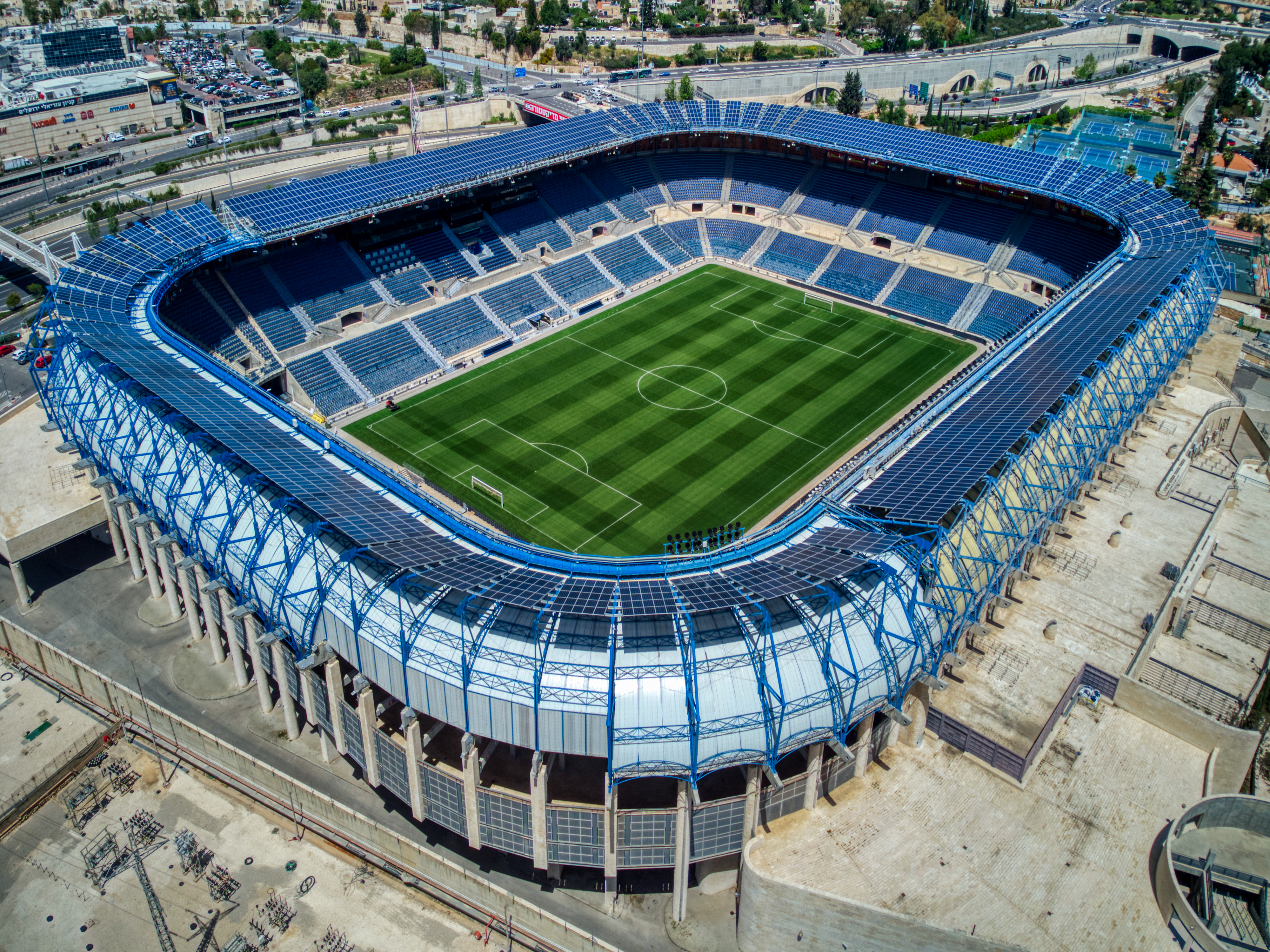
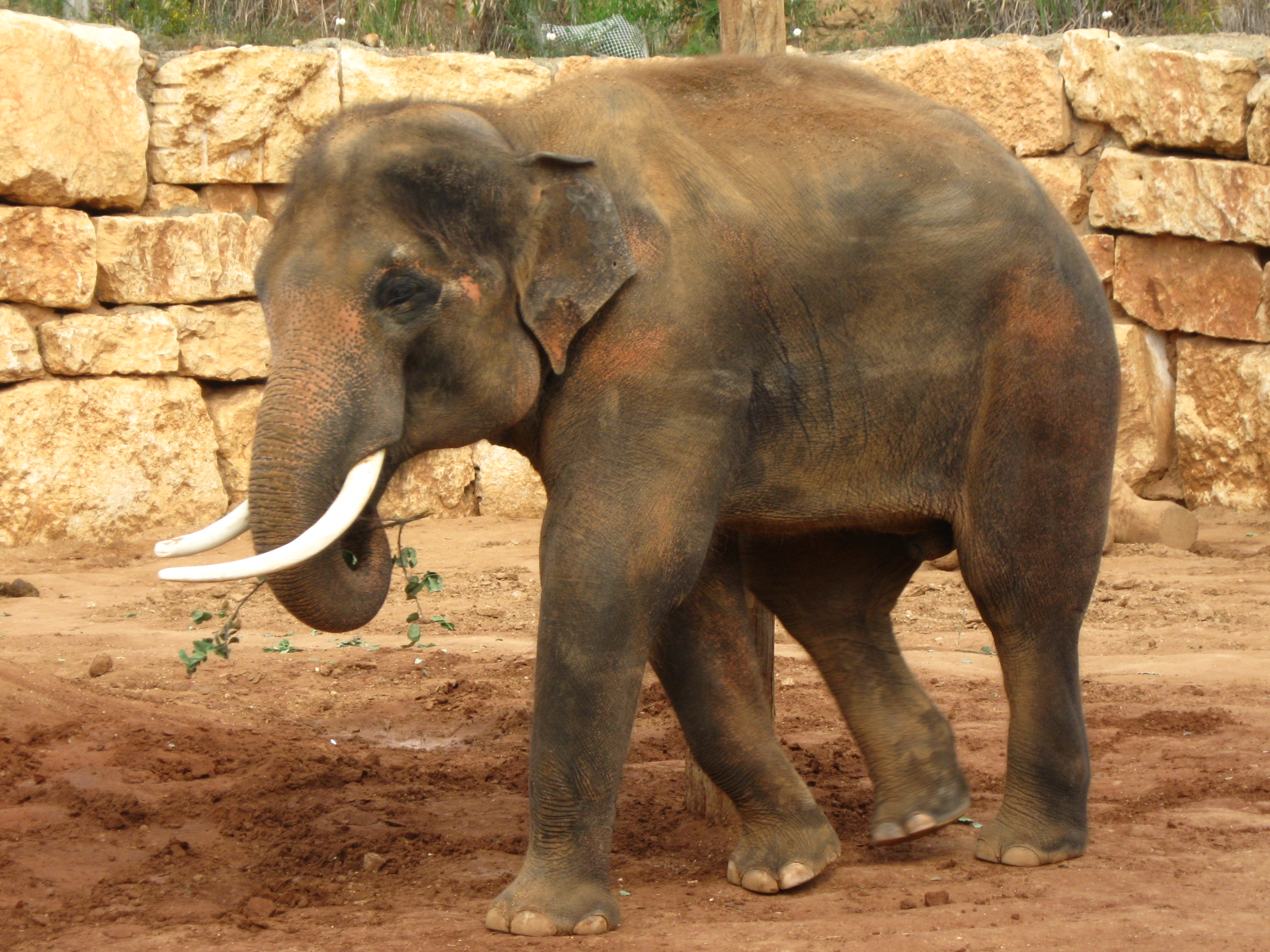
Teddy Kollek was regarded as the "number-one friend" of the Jerusalem Biblical Zoo. The zoo had been located on a 15 acre (15 acre) site in Romema from 1950 to 1991. Although it attracted many visitors with its exhibits of animals, reptiles, and birds mentioned in the Bible, and was successful in breeding and protecting endangered species, it was generally considered small and inferior compared to zoos in Tel Aviv and Haifa.
Kollek championed the idea of relocating the zoo to a larger, more modern facility. Around 1990, under the auspices of the Jerusalem Foundation, the Tisch family of New York agreed to provide financial support for this ambitious undertaking. The zoo, officially renamed The Tisch Family Zoological Garden in Jerusalem, reopened in 1993 on a sprawling 62 acre (62 acre) expanse near the Malha neighborhood. Kollek personally helped the zoo raise funds for the construction of its elephant enclosure and for the acquisition of female elephants from Thailand, each costing 50.00 K USD. In a gesture of honor to the mayor and his wife, the zoo named its male elephant "Teddy" and one of its female elephants "Tamar." For Kollek's 90th birthday in 2001, the zoo celebrated him, and the Jerusalem Foundation unveiled a new sculpture garden dedicated in his honor at the zoo.
5. Retirement and death
Even after stepping down from public office, Teddy Kollek remained active. He maintained a five-day work week well into his nineties, despite increasing physical infirmity. He and his wife resided in their walk-up apartment in Rehavia until the mid-1990s, when they moved to Hod Yerushalayim, a retirement home located in the Kiryat HaYovel neighborhood of Jerusalem.
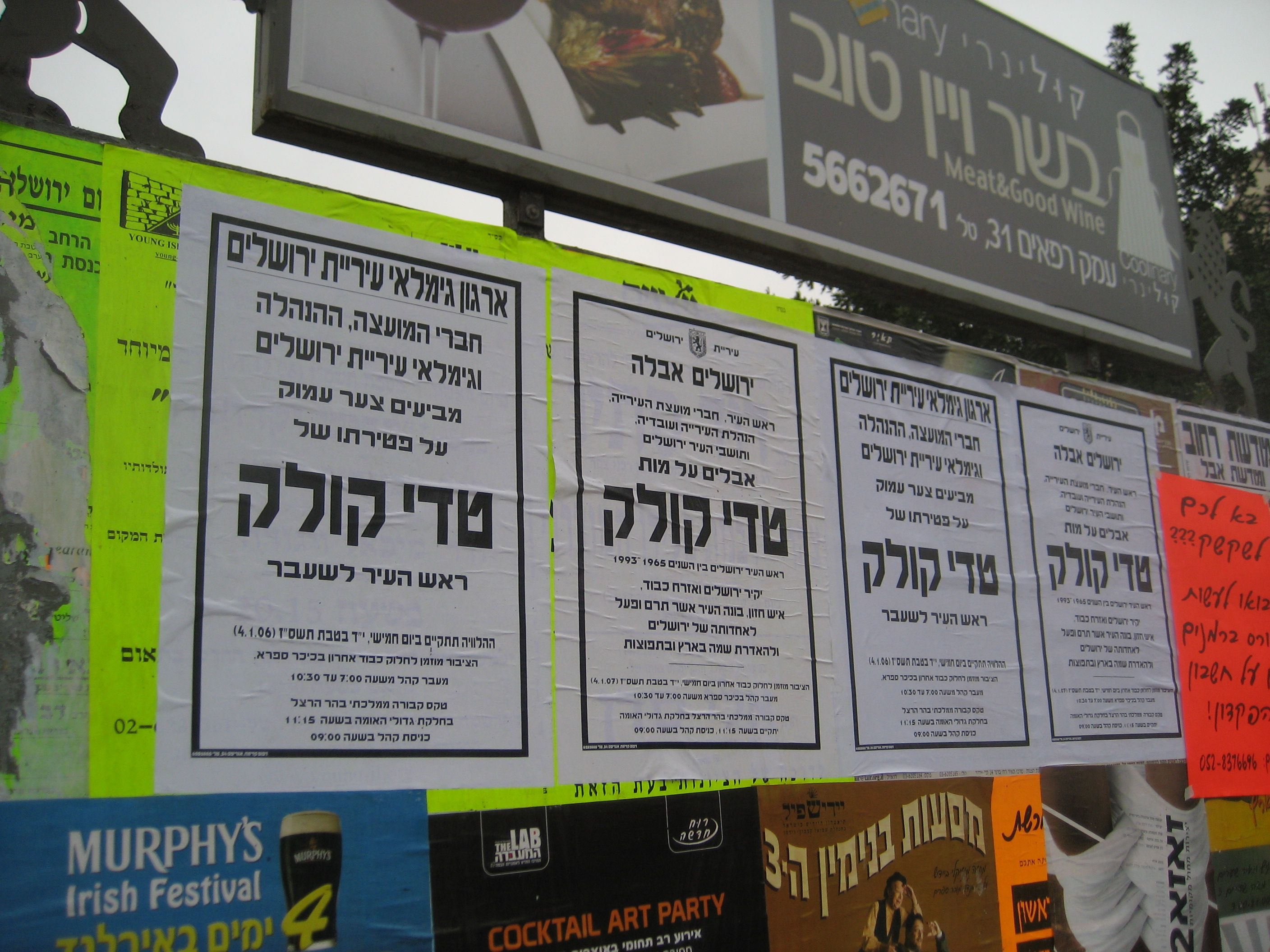
Teddy Kollek died on January 2, 2007, at the age of 95. He was laid to rest at the Mount Herzl national cemetery in Jerusalem, a site reserved for Israel's national leaders and fallen soldiers.
6. Books Published
Teddy Kollek authored several significant books, including his autobiography, providing insights into his life and vision for Jerusalem.
- For Jerusalem: A Life by Teddy Kollek
- Jerusalem: a history of forty centuries
7. Awards and commemoration
Kollek received numerous prestigious awards and honors throughout his life, acknowledging his significant contributions to society and the State of Israel. His legacy is also commemorated through several public monuments and institutions.
- In 1985, Kollek was awarded the Peace Prize of the German Book Trade.
- In 1988, he received the Israel Prize for his exceptional contributions to the society and the State of Israel, recognizing his lasting impact.
- Also in 1988, he was honored with the Four Freedoms Award from the Roosevelt Institute, specifically for the Freedom of Worship, highlighting his efforts in promoting religious tolerance in Jerusalem.
- In 1996, Kollek was awarded the Prize of Tolerance by the European Academy of Sciences and Arts.
- In 2001, he was bestowed with the title of Honorary Citizen of Vienna, his childhood city.
In Jerusalem, the Teddy Stadium in Malha is named after him, as is the Teddy Fountain, serving as enduring tributes to his indelible mark on the city.
8. Quotes
Teddy Kollek's views on Jerusalem, peace, and civic life are encapsulated in several significant quotes that reflect his profound understanding of the city's unique challenges and its potential for coexistence.
- "Jerusalem's people of differing faiths, cultures and aspirations must find peaceful ways to live together other than by drawing a line in the sand."